Business
How a Startup Incubator Can Accelerate Your Business
Published
2 years agoon
By
Carmen Day
In today’s fast-paced and competitive business landscape, startups often find themselves navigating a maze of challenges that can hinder their growth and potential.
This is where the concept of a startup incubator comes into play as a guiding light for emerging ventures. A startup incubator is more than just a physical space; it’s a dynamic ecosystem designed to nurture and propel early-stage ventures toward success.
In this article, we’ll tackle some of the most common questions surrounding incubators. For instance – what is the role of a startup incubator? How does it differ from an accelerator?
And most importantly, how can it optimize your business?
Let’s begin!
What is an incubator in a startup ecosystem?
In a startup ecosystem, an incubator refers to a supportive environment or program designed to help early-stage startups grow and develop.
Incubators provide a range of resources and services to entrepreneurs, typically for a fixed period of time, with the goal of nurturing and accelerating the growth of their businesses.
Here’s the usual process of how an incubator supports a startup:
Onboarding
Startups who applied and were accepted are welcomed into the incubator with an orientation session. During this phase, startups get an overview of the program’s structure, expectations, and available resources. They also meet their mentors, advisors, and fellow cohort members.
Mentorship and Guidance
Startups are paired with mentors who have relevant industry experience or expertise.
Regular mentorship sessions provide guidance, feedback, and insights to help startups navigate challenges and refine their strategies.
Workshops and Training
Incubators organize workshops, seminars, and training sessions on various aspects of entrepreneurship. Topics covered during the startup incubator program may include:
- Business planning
- Marketing strategies
- Product development
- Legal and regulatory matters
- Fundraising
Access to Resources
Aside from training sessions, startups can also gain access to resources such as:
- Office space
- Co-working environments
- Internet connectivity
- Meeting rooms
Some incubators provide access to shared equipment, startup software, and other tools needed for product development.
Networking and Events
Incubators often facilitate networking events, pitch sessions, and demo days where startups can showcase their progress to potential investors, partners, and the broader community.
Business Development
Startups work on refining their business models, products, and market strategies. They receive support in identifying their target audience, creating a value proposition, and developing a sustainable revenue model.
Funding and Investment
Incubators may provide introductions to potential investors, venture capitalists, and angel investors Startups also learn about different funding options and how to pitch their ideas to secure investment.
Graduation
Successful completion of the incubator program results in a “graduation” for startups.
Graduated startups may continue to receive support through alumni networks, ongoing mentorship, or access to incubator resources.
Startup Incubator vs. Accelerator

A startup incubator and a startup accelerator are both support programs designed to assist early-stage startups, but they have distinct characteristics and objectives. Here’s a comparison between the two:
- Focus. Incubators typically have a broader focus and cater to startups in various stages of development. They often work with startups that are in the ideation or early development phase. Accelerators, on the other hand, are more specialized and typically work with startups that have a viable product or service and are ready to scale rapidly. They focus on accelerating growth and reaching key milestones quickly.
- Stage. Incubators are well-suited for startups that are still refining their business models, conducting market research, and building their initial product or service. Accelerators, meanwhile, are best suited for startups that have a minimum viable product (MVP) and are seeking to refine their business model, gain traction, and secure funding to scale.
- Mentorship. A startup incubator provides mentorship and guidance, often with a focus on helping founders refine their business ideas, develop prototypes, and validate their concepts. On the other hand, an accelerator’s mentorship is often geared towards specific aspects of growth, such as scaling operations, marketing, fundraising, and product-market fit.
Startup Incubator Examples

If you’re looking for the best startup incubators in the world, here are a few you of the most popular ones to consider.
1. Y Combinator
Situated in the USA, Y Combinator is considered one of the best startup incubators which has played an instrumental role in fostering the growth trajectories of some of the most renowned startups globally. The Y Combinator program spans a duration of three months, during which startups receive a funding injection of $500,000, albeit subject to certain conditions.
Subsequently, founders are immersed in a sequence of mentoring and refinement initiatives that culminate in the prestigious Demo Day. Here, founders showcase their concepts to an audience comprising investors and handpicked media representatives.
Mentees: Airbnb, Dropbox, Coinbase, Gitlab
2. Techstars
Techstars directs its energy toward nurturing startups rooted in technology. Since its inception in 2006, Techstars has been a driving force behind the growth of numerous startups. Annually, they select more than 500 fledgling companies, providing them with up to $120,000 in investment and the invaluable chance to partake in mentorship programs.
Backed by an impressive funding sum of $21.3 billion, Techstars stands out as a reliable choice for technology-oriented startups. Within its portfolio of activities, Techstars hosts several high-profile events and initiatives, including Startup Week and Startup Weekend.
Mentees: Uber, DigitalOcean, SendGrid
3. 500 Startups
500 Startups operates as a dual-purpose platform, functioning as both an accelerator program and a seed fund dedicated to startups. Positioned primarily as a venture capital entity, they proudly proclaim a management portfolio worth $2.7 billion. Their primary interests converge on sectors where technology, innovation, and capital growth converge harmoniously.
Their extensive investment history spans more than 2,600 startups worldwide, underscoring the maturity and comprehensiveness of their accelerator program across diverse markets.
Mentees: Grab, Canva, Credit Karma
Frequently Asked Questions (FAQs)
Do I need an incubator for my startup?
If you’re in the early stages, lack experience, and could benefit from structured guidance, resources, and mentorship, an incubator might be valuable. However, if you’re aiming for rapid growth and have a clear roadmap, an accelerator could be more appropriate.
Do startup incubators provide funding?
Yes, many startup incubators provide funding as part of their support package. However, the funding offered by incubators can vary widely depending on the specific program, location, and the terms of the agreement. Some incubators offer direct funding to startups, while others may connect startups with potential investors or provide resources to help them secure funding elsewhere.
Business
Top 10 Best Places to Buy a Mid Century Modern Office Chair
Published
2 weeks agoon
July 4, 2025
What was once old is new again: mid century modern is back in style. From architecture to furniture, the postwar look is in, and the hype extends all the way to office chairs.
Do you need a mid century modern office chair in your life? If so, there’s plenty to choose from. Your office chair should be tailored to your style, whether you like luxury, utility, or something in between.
That’s why we’ve put together our 10 favorite places to find your ideal mid century modern office chair.
What is mid century modern design?
After World War II, spirits were high in the US, and new technology was taking the country by storm. Mid century modern refers to the design concepts that came about during this time.
As opposed to the frilly, ornate designs of classical furnishings, mid century modern designs are angular, material, and functional. Wood is a common design element, especially teak. Mid century modern furniture may also have materials like glass, vinyl, and metal. Designs are simple and geometric, with bold accent colors to make them pop.
The mid century modern aesthetic never really went away, but it’s made a noted comeback in recent years. Some have chalked it up to Boomer and Gen X nostalgia, others point to mid-century-set shows like Mad Men and The Marvelous Mrs. Maisel.
Why should I buy a mid century modern office chair?
Mid century modern is the perfect fusion of style and utility. If you want to cultivate an office space that commands respect without being ostentatious, mid century modern is the style for you.
When it comes to office chairs, an MCM one is often made with sturdy wood and vinyl. They combine the ergonomics of a modern office chair with old-fashioned grace.
If you’re concerned with utility and utility only, a more bog-standard office chair may suit you. But a mid century modern office chair is great for someone who wants to wow colleagues with a mature, thoughtful business space.
Where can I get a mid century modern office chair?
1) Wayfair
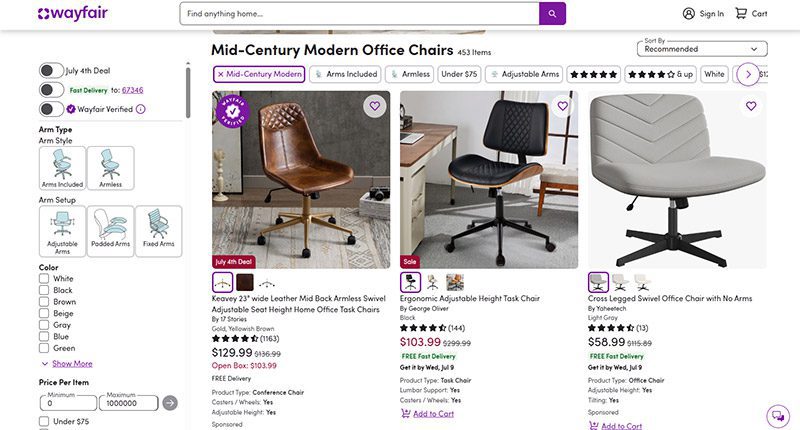
When it comes to furniture, Wayfair offers the best of both worlds. Their goods, including their mid century modern office chairs, are stylish and affordable. You can get a sturdy task chair for less than $100 or a more distinguished seat for less than $350.
MCM office chair examples: Dovray ($126), Bradford ($139), Lithonia ($133)
2) France & Son
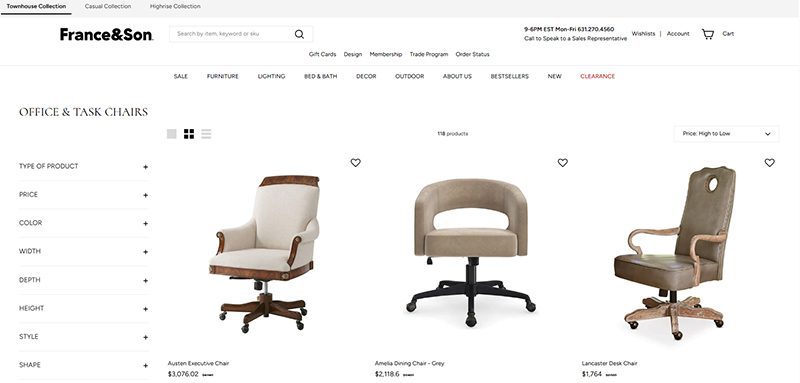
Wayfair’s chairs are affordable, but France & Son is the perfect option for luxury shoppers. Their mid century modern office chairs are robust and sleekly designed. If you dress to impress and enjoy the finer things in life, these are the chairs for you.
MCM office chair example: Brooks ($695)
3) Houzz
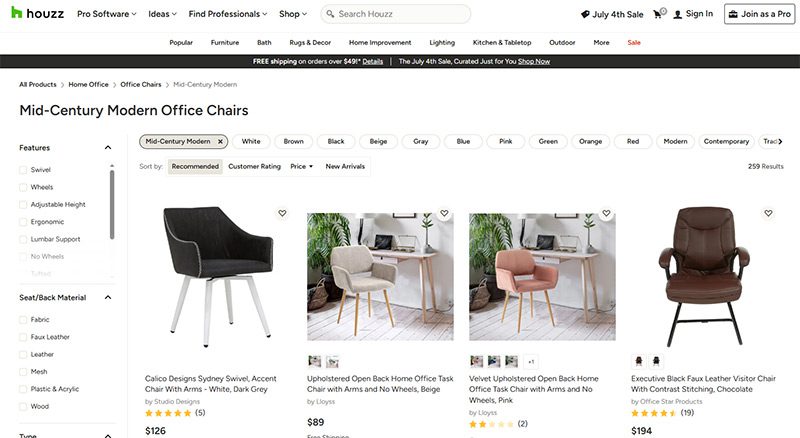
Started as a community for people to share home decor tips, Houzz has become a great ecommerce platform for finding stylish furniture. They’re more known for home decor than desk chairs, but they have plenty of great, affordable finds if you know where to look.
MCM office chair examples: Arvilla ($173), Rathburn ($259)
4) Laura Davidson
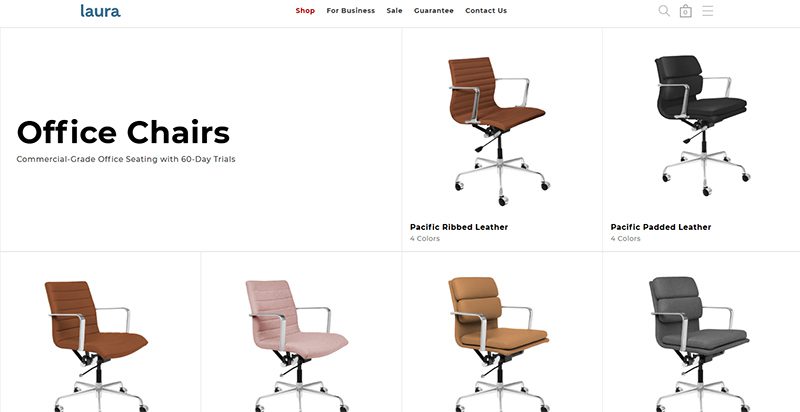
The Laura Davidson collection offers a fairly limited selection of classic office furniture. Still, there’s a reason they’re trusted by big-wigs like Apple, Disney, and Salesforce. Their chairs are sturdy and beautifully designed, reimagining classic Eames and Knoll designs.
MCM office chair examples: Rockefeller ($275), SOHO II Soft Pad ($450)
5) Icons of Manhattan
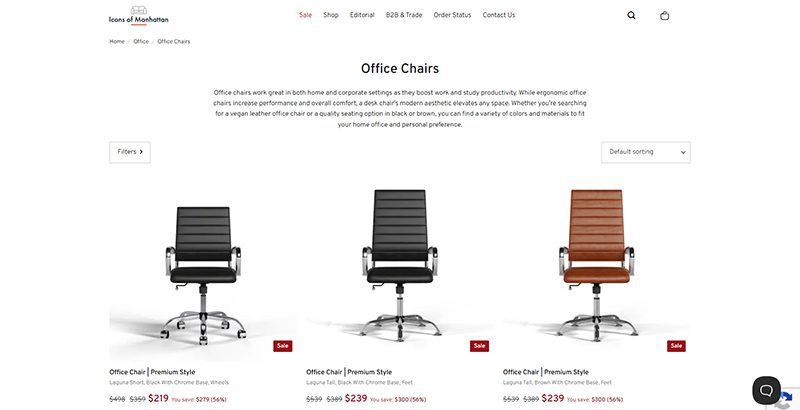
Icons of Manhattan has a simple philosophy: do one thing, and do it right. Their office chairs are handcrafted from premium materials and tailored to a mid-century modern style. If you want that Mad Men energy in your office (hopefully with a lot less angst), these are the chairs for you.
MCM office chair example: Ribbed Medium ($219)
6) Amazon
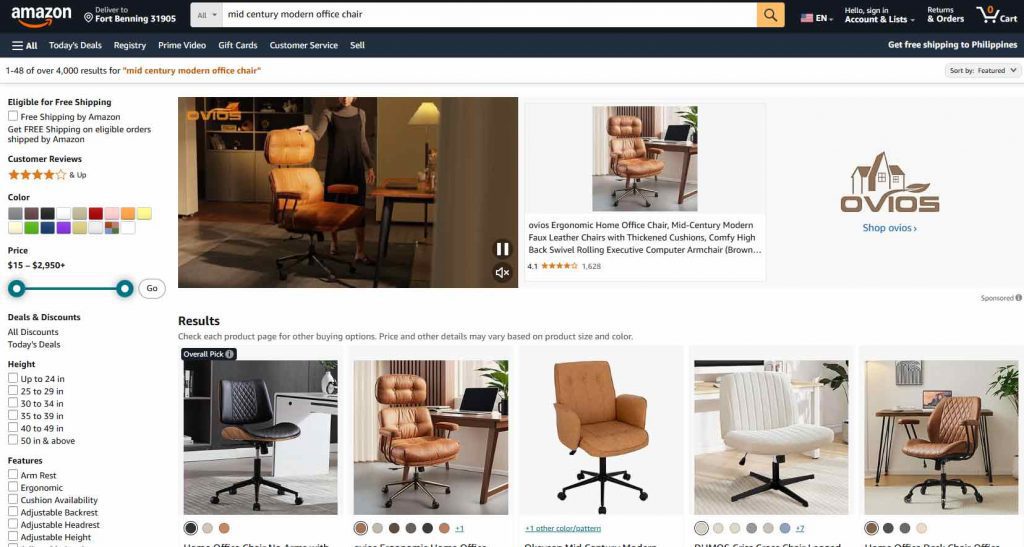
Yes, the internet’s premier shopping destination has a robust collection of mid century modern office chairs. Like with most products, their selection of seats is vast and can be hit or miss. Still, they’ve got stunning chairs available for any style, whether you care about comfort, class, or ergonomics.
MCM office chair examples: IDS Home Modern ($219), Art Leon MCM Swivel ($139)
7) AllModern
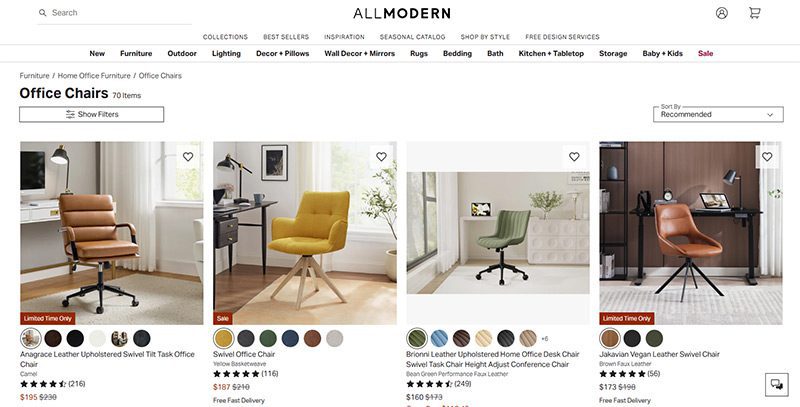
AllModern’s collection of desk chairs and other furniture truly embodies the mid century modern spirit. Their work is tight, angular, and functional above all. They’re part of the Wayfair family and they traffic in a number of modern styles, but their sleek chairs are perfect for any mid century modern space.
MCM office chair examples: Frederick ($229), Kealey ($349)
8) Overstock
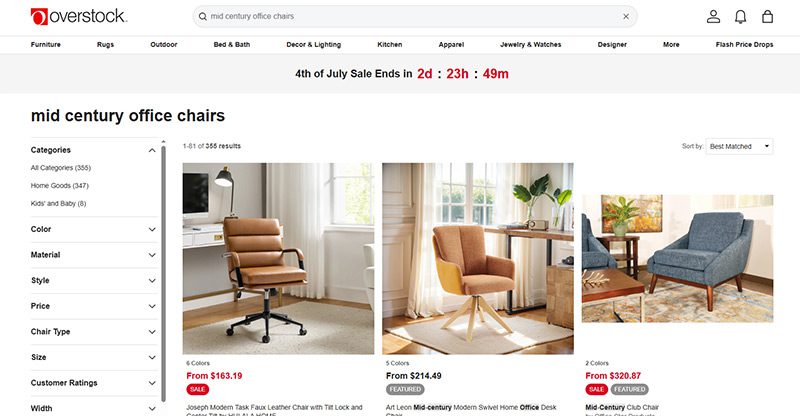
Overstock is known as a one-stop shop for quality home goods at sub-wholesale prices. If you want a spiffy mid century modern office chair that won’t break the bank, they’re the first place to look. While they’re somewhat less reliable than the more upscale platforms on this list, their selection is massive.
MCM office chair example: Joseph Modern ($163)
9) Walmart
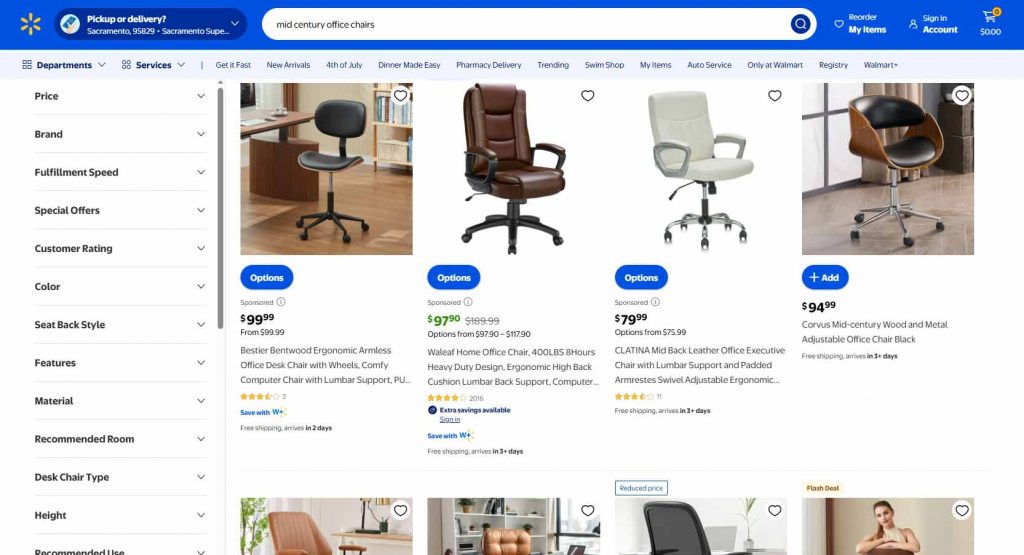
Hayneedle’s selection of mid-century modern office chairs falls somewhere between the minimal Laura Davidson and the endless Amazon catalog. Their array of mid-century designs is affordable and versatile, with chairs that match almost any style. While they may be part of the Walmart family, these chairs are anything but second-rate.
MCM office chair example: Waleaf ($97)
10) Target

Why splurge when you can save? As usual, Target is a hidden gem, offering a sturdy selection of mid century modern office chairs for some of the cheapest prices out there. Many of the chairs they offer are from the same designers as these other stores—Christopher Knight, LumiSource, Armen Living, etc.—at reduced prices.
MCM office chair example: Lombardi ($136)

A quality payroll service is one of the most invaluable tools any entrepreneur can have. Whether you’re a small business owner or an HR manager, paying your employees on time is crucial. This makes choosing a service even more weighty, after all, it is a heavy administrative burden. The good thing is, you can outsource this duty to an online payroll processor.
According to statistics, 49% of workers begin a new job search after just two paycheck errors, and with 65% of workers living paycheck to paycheck, it’s more important than ever to ensure an efficient, effective payroll process.
These services can save you precious time and mitigate potential issues. To make it easy for you to choose, we listed the best online payroll services for 2025.
Top 5 Online Payroll Services
Gusto
Gusto is a great option for both new and experienced payroll administrators, boasting an incredibly clean user interface and a first-rate payroll setup. Gusto lets you manage your employee’s time off (vacation and sick pay), company health insurance, and worker’s comp. Gusto offers excellent mobile access, too. This allows employees to manage aspects of their Gusto profiles, view payday insights, and access Gusto Wallet financial tools.
Gusto offers four tiers of membership, the most affordable of which is the Contractor’s Only plan, which offers unlimited U.S.-based and global contractor payments, supporting more than 100 countries, plus 1099 creation and filing at a rate of $6 per person per month with no base price.
The other three are Simple, Plus, and Premium. Here’s a deeper look into each plan:
Simple
Price:
$40/mo + $6/mo per person
Plan details:
- Full-service single-state payroll including W-2s and 1099s
- Employee profiles and self-service
- Basic hiring and onboarding tools
- Gusto-brokered health insurance administration
- Employee financial benefits
- Payroll and time-off reports
- Custom admin permissions
- Integrations for accounting, time tracking, expense management, and more
Plus
Price:
$80/mo + $12/mo per person
Plan details:
(All Simple plan features +)
- Full-service multi-state payroll including W-2s and 1099s
- Next-day direct deposit
- Advanced hiring and onboarding tools
- PTO management and policies
- Time tracking and project tracking
- Workforce costing and custom reports
- Team management tools
- Full support
Premium
Price:
Bespoke pricing, reach out for a personalized quote
Plan details:
(All Plus plan features +)
- HR Resource Center
- Compliance alerts
- Access to certified HR experts
- Full-service payroll migration and account setup
- Health insurance broker integration
- R&D tax credit discount
- Waived fees and exclusive pricing
- Performance reviews
- Employee surveys and insights
- Dedicated support
QuickBooks Online Payroll
Founded in 1983, Intuit is a California-based financial software company. Since its inception, Intuit has developed into one of the best-known providers of accounting software. Their online payroll service, QuickBooks, includes the essential features you need to run payroll.
QuickBooks offers three tiers of membership. The least expensive membership covers basic accounting features, such as invoices. For more features, check out the Essentials and Plus memberships. Each plan’s features are as follows:
QuickBooks Simple Start (2025)
- Price: $38/month for 1 user
- Best for: Freelancers and small teams with basic payroll needs
Features:
- Automated bookkeeping
- 5 free ACH bank transfers/mo for bills
QuickBooks Essentials (2025)
- Price: $75/month for 3 users
- Best for: Small businesses needing deeper financial tracking
Features:
- Includes all Simple Start features, plus:
- Recurring invoices
QuickBooks Plus (2025)
- Price: $115/month for 5 users
- Best for: Growing businesses with HR and compliance needs
Features:
- Includes all Essentials features, plus:
- AI-powered profit & loss insights
- Anomaly detection and resolution
- Budgeting
QuickBooks Advanced (2025)
- Price: $275/month for 25 users
- Best for: Established businesses with HR and compliance needs
Features:
- Includes all Plus features, plus:
- Custom user management and permissions
- Custom report builder
- Data sync with Excel
- Revenue recognition
- Forecasting
OnPay
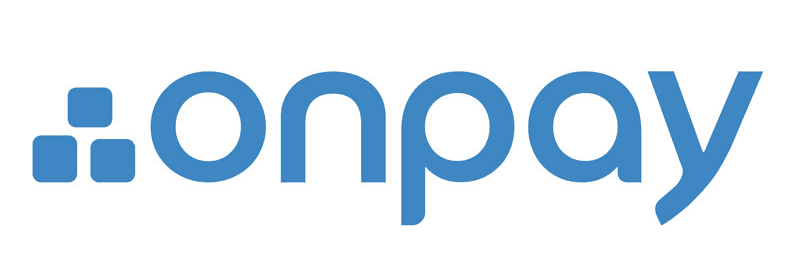
OnPay is a cloud-based full-service payroll processing system capable of running payroll according to a preset schedule, automatically disbursing wages, and calculating and withholding taxes.
OnPay can sync up with several other software your team is already using, making it easy to integrate the service into your team’s system. Another benefit of OnPays model is the simple, transparent pricing structure. No tiers; just one base rate.
Pricing:
$49/mo + $6/mo per employee
SurePayroll

SurePayroll’s award-winning service supports W-2 employees and 1099 contractors. Additionally, it handles 401(k) deductions and manages flexible spending accounts (FSA) and health savings accounts (HSA).
SurePayroll also offers a mobile app— available on both Apple and Android devices.
SurePayroll offers live support through its United States-based support team through chat, email, or phone.
Small Business Payroll
- Price: No Tax Filing: $20/month + $4 per employee, Full Service: $29/month + $7 per employee
- Best for: Small businesses and startups
Features:
- We file and deposit your federal and state taxes!
- Run payroll in 3 simple steps
- Schedule payroll to run automatically
- Unlimited payroll runs and free 2-day direct deposit
- Reports and pay stubs are available online 24/7
- Supports W-2 employees and 1099 contractors
Nanny & Household Payroll
- Price: Full-Service Household, $39/month, includes 1 employee, $10 per additional employee
Best for: Homeowners
Features:
- Signature-ready Schedule H
- We file & deposit your federal and state taxes!
- Run payroll in 3 simple steps
- Schedule payroll to run automatically
- Unlimited payroll runs and free 2-day direct deposit
- Reports & paystubs available online 24/7
- Supports W-2 employees & 1099 contractors
Be sure to choose a payroll service that works for your business, and provides you with the peace of mind that comes with a reliable bookkeeping system. Your employees will thank you.

Merck is currently in talks to acquire Seagen, a biotech company. The Wall Street Journal reports that the transaction is valued at $40 billion. And what happens if Merck acquires Seagen, and how would this acquisition benefit cancer research and treatment? Read more about the Merck Seagen buyout here.
Merck Seagen Buyout
Merck and Seagen are still deciding on their share prices. So far, talks have yet to reach an agreement on $200 per share. Both companies want to settle and finalize their deals before Merck announces its quarterly earnings on July 28. At the time of writing, Seagen’s stock was at $176.19.
With an estimated market value of $235 billion, Merck is looking to expand its presence in the cancer treatment space. The Merck Seagen Buyout could play a major role in that strategy. Since Seagen specializes in targeted cancer therapies, the acquisition would give Merck access to a broader range of oncology products.
Shareholder reactions to the new deal are overwhelmingly positive, and the stocks have been up since talks about the deal have been made public.
But this is not the first time that Merck and Seagen have made the news. Back in 2020, they collaborated because of cancer treatments. Seagen has a drug conjugate (ladiratuzumab vedotin) which would be used in conjunction with Merck’s Keytruda.
Merck reveals that Keytruda is its highest-selling product. It’s immunotherapy for cancer.
And this deal could help Merck offset the possibility of reduced sales because it will lose patent protection in 2028.
As promising as this deal is, there could be scrutiny from antitrust officials since there might be a litigation case from the Federal Trade Commission or Justice Department.
The Seagen buyout isn’t the only deal Merck has made recently. They’ve been busy closing another deal, but with Orion too.
Seagen
As a cancer biotech company, Seagen has therapies to ensure that patients benefit from the treatment and reduce any adverse side effects. Their treatments involve the therapy attacking tumors with toxins.
Merck partnering with Seagen isn’t a bad idea considering that Seagen made $1.4 billion in sales in 2021, most of it coming from Adcetris and Padcev (a treatment for urothelial cancers).
Merck-Orion Deal
In the middle of the Merck Seagen Buyout, Merck has recently partnered with Orion for the ODM-208 and other drugs. These drugs are related to the production of steroids. Orion found how it can combat hormone-dependent cancers and further developed this inhibitor.
Their deal includes that they should develop ODM-208 and promote it to the public together. And Orion will receive a $290 million payment from Merck.
Although they’re co-developing and marketing the new inhibitor, Orion will oversee the manufacturing side.
Co-developing the ODM-208 can help Merck with its current research and treatments for prostate cancer. President and CEO of Orion, Timo Lappalainen, says that this partnership will benefit Merck’s goals of treating cancer worldwide.
Other Ventures: Merck’s Role in the Pandemic
You may have heard about COVID-19 pills, which are a form of treatment for those diagnosed with mild to moderate COVID-19. Merck introduced an antiviral COVID-19 pill to the public. The name: Molnupiravir.
The COVID-19 pill is not a replacement for a vaccination. Instead, it stops the replication of the COVID-19 genetic code and keeps the patient out of the hospital. Not yet FDA-approved, Molnupiravir has been authorized for emergency use since December 23, 2021.
And for other stories, read more here at Owner’s Mag!

Should I Buy an Electric Scooter? What You Can Learn

Best Workflow Mapping Tools for Smarter Business Processes

Top White Label Marketing Tools for Agencies: Our 10 Best Picks

Virtual Reality Exhibit Carne Y Arena: The Refugees’ Plight

Top 10 Podcast Editing Software Applications for Beginners

What Is Tiktok Pink Sauce? The Viral Condiment, Explained

Did You Drop Your Smartphone in The Ocean? Here’s How to Retrieve It

Top White Label Marketing Tools for Agencies: Our 10 Best Picks

History of the NBA: The Success Behind the Big League

Demio SaaS 2025 Review: Features, Pricing, Pros & Cons

Did You Drop Your Smartphone in The Ocean? Here’s How to Retrieve It

Virtual Reality Exhibit Carne Y Arena: The Refugees’ Plight

Best Workflow Mapping Tools for Smarter Business Processes

Gift Guide: 25 Best Gifts for Women for All Occasions
Trending
- Technology17 hours ago
Top White Label Marketing Tools for Agencies: Our 10 Best Picks
- Technology22 hours ago
Virtual Reality Exhibit Carne Y Arena: The Refugees’ Plight
- Technology15 hours ago
Best Workflow Mapping Tools for Smarter Business Processes
- Technology22 hours ago
Top 10 Podcast Editing Software Applications for Beginners
- Lifestyle6 hours ago
Should I Buy an Electric Scooter? What You Can Learn


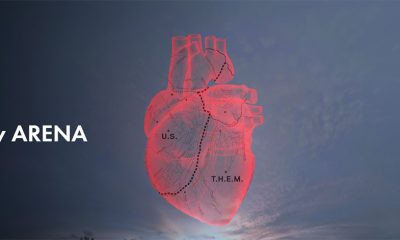


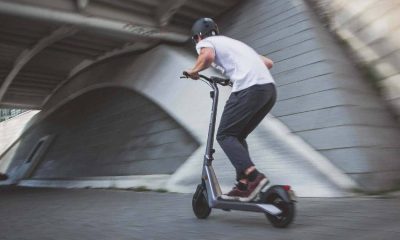
Kitesa edesa
November 4, 2023 at 1:16 pm
I have experienced so I work with you